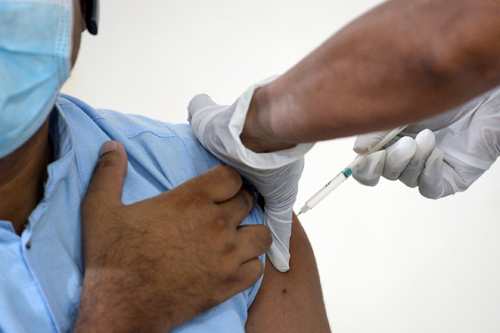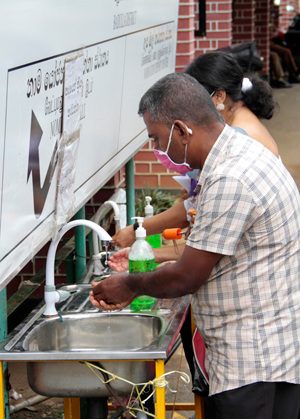Protecting our own ‘castles’ from COVID-19 invasion

Getting the vaccine is not an excuse to stop adhering to health precautions. Pix by Indika Handuwala
COVID-19 has changed the way we live in unprecedented ways. At this time, it is important that we understand our immune system and how it works to protect us.
Your immune system
The immune system is the mechanism the body has to protect itself. The body is designed like a castle in terms of defences. A castle has walls as barriers that act as nonspecific deterrents to most invaders. Then there are ordinary soldiers with weapons followed by Special Forces ready to be deployed against the few really aggressive invaders that get past all the defences.
Our immune system is organized in the same way. It is made up of two parts. One part is called the innate immune system and is made up of barriers like the skin and other cells and proteins which generally act to keep invading organisms at bay.
 The innate immune processes may be enough to control the invading organism. However, if this fails the special forces of the adaptive immune system are called in. The adaptive immune system is made up of specialized cells and proteins that are able to specifically recognize infection-causing organisms. This is much like the CID specifically recognizing a criminal after DNA and fingerprints have been collected from a crime scene and the criminal specifically identified. The adaptive immune system then makes proteins called antibodies that are specific to act against the invading organism. Because they are specific to the organism, they are able to efficiently and effectively search out and destroy all disease-causing microorganisms. This adaptive response takes time (days to weeks) to develop. Until then, the innate system, which acts within minutes, is what keeps things under control.
The innate immune processes may be enough to control the invading organism. However, if this fails the special forces of the adaptive immune system are called in. The adaptive immune system is made up of specialized cells and proteins that are able to specifically recognize infection-causing organisms. This is much like the CID specifically recognizing a criminal after DNA and fingerprints have been collected from a crime scene and the criminal specifically identified. The adaptive immune system then makes proteins called antibodies that are specific to act against the invading organism. Because they are specific to the organism, they are able to efficiently and effectively search out and destroy all disease-causing microorganisms. This adaptive response takes time (days to weeks) to develop. Until then, the innate system, which acts within minutes, is what keeps things under control.
The adaptive immune system has a special feature called memory. Once an invading organism is identified, it will be able to remember that organism (like having a series of pictures of all criminals the CID ever encountered). If that organism is encountered again, the adaptive immune system will act much faster, this time within a few days to clear the organism.
Boosting your immunity
If you take a balanced diet, with fresh fruits, vegetables, grains and proteins and get enough sunlight (Vitamin D) your immune system will receive all the nutrients it needs to function properly. Most pharmaceutical supplements contain combinations of the vitamins and minerals that are helpful to the immune system. The other ‘immune boosting’ supplements generally have no evidence that they work. Be practical. No one takes supplements and then stops boiling their water because they think their immunity is so good that they don’t need to drink clean water.
In the same way, in these times, of the COVID pandemic, don’t take a supplement and imagine that this makes you superhuman. No supplement will do this. The most practical thing you can do to keep yourself safe is to follow public health guidelines and wear a mask, wash your hands or perform hand hygiene frequently, and keep social distance. This is the best ‘supplement’ you can find.
Immunity to COVID-19
Once you are infected, the specific adaptive antibody response takes time to start and patients usually develop antibodies at about day 8 to 11 after the start of symptoms. The antibodies will reach peak levels at about 3 weeks when people have started to recover.
We don’t know how long these antibodies last. It could be months, it could be years. The importance of this is that we don’t know if 1) getting COVID-19 means you are immune from getting it again 2) if you are protected, we don’t know how long this protection will last. So even if you have had COVID-19 it is vitally important that you follow public health guidelines and wear a mask, perform hand hygiene and maintain social distance, to protect yourself and others.
The COVID vaccine
What is a vaccine? Vaccines are made from the organism or parts of the organism. The organisms can be alive but weakened, inactivated, or killed. When we give a vaccine, it acts as the first encounter our immune system has with the microorganism. The specific adaptive response occurs and specific antibodies are formed that act against that particular organism. If you get a booster shot, that acts as the 2nd encounter your immune system has with the organism, and this allows for further training of the antibodies to become even more specific at killing that microorganism. When you finally meet the organism in the natural environment your immune system is now meeting this organism for the 3rd time and already has an arsenal of highly specialized, effective antibodies made against this particular microbe. These will start to act immediately and neutralize the threat rapidly resulting in you not getting sick.
Not everyone who gets the vaccine will develop antibodies. This is called the ‘efficacy’ of the vaccine. A 90% efficacy rate means that if a 100 people are vaccinated, only 90 of them will be protected. No vaccine is perfect and getting a 90% or more efficacy is pretty great.
One thing that is important to remember however is that developing these antibodies takes time and you are not immune the day after you get the injection. Getting the vaccine is not an excuse to take off your mask and party. There is a chance you may not develop antibodies and if you do, they will only reach high levels a few weeks after the booster dose. So even if you get the vaccine, you still need to follow public health guidelines and wear a mask, perform hand hygiene and keep social distance.
We don’t know how long the antibodies that form after vaccination will last. Just like with natural immunity, this could be several months or it could be years. We also don’t know if the vaccines will work against all the variant strains of the virus that are circulating.
Safety
Vaccines go through some of the most rigorous safety testing protocols in existence. Although the COVID vaccines were developed very fast, there was no compromise in the safety testing stages and the data from these trials have to be made available to the regulatory authorities when requesting registration. These vaccines are safe. Sri Lanka is currently administering the Oxford AstraZeneca vaccine to its healthcare workers and defence forces. Common side effects include fever, chills, joint pains, pain and fatigue. At the moment those who have allergies to the vaccine components and pregnant or breast feeding mothers are advised not to take the vaccine. In the latter groups, the benefit of vaccination can be weighed against the risk, which is the lack of testing and so the lack of scientific knowledge of what could happen.
Why get the vaccine
This is the best measure you can take given the current circumstances to protect yourself and others. Even if the vaccine doesn’t provide a person with full protection, it will at least act to reduce the severity of the illness should a person get the virus.
The ultimate aim is to get to a stage of ‘herd immunity’. That is where 60-70% of the general population is immune to the virus. When this happens, there are enough people with immunity to indirectly protect the unimmunized. This is because there is either no, or very few sources for the unimmunized person to get the infection from and they are protected by the immunity of others.
Overall, until vaccination is rolled out at a national level, the most important thing that people can do is to help their immune systems by avoiding getting exposed to the virus. You do this by the vitally important public health measure reiterated in this message. Even once vaccines for the public are being rolled out, the public health measures are mandatory and must be observed until the health authorities say otherwise. Getting the vaccine is the safest and fastest way to get to a stage where enough people in the population are immune so that public health measures are no longer necessary.
The writer is an Immunologist of the Department of Microbiology, Faculty of Medicine, University of Peradeniya.



